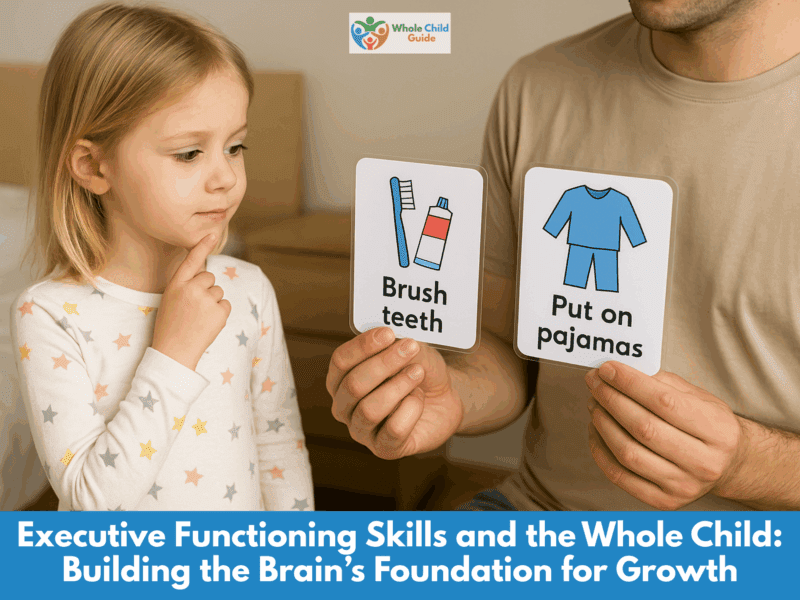
When we talk about the skills kids need to thrive in school, at home, and in life, we often think of focus, organization, memory, and the ability to manage emotions. All of these fall under one essential area of development: executive functioning. Executive functioning skills and the whole child is one area that parenting support can cover. It’s a brain skill that is involved with every functional life skill and parents play a major role in this development.
Executive functioning skills are like the brain’s management system. They help children plan, start, and finish tasks, stay flexible when things change, and regulate attention and behavior. These abilities are foundational for academic success, social relationships, and independence.
In this post, we’ll cover:
- What executive functioning skills are
- Why they matter to whole child development
- How to support executive functioning through daily life
- How Whole Child Guide can help families and professionals with this important area
What Are Executive Functioning Skills?
First it’s important to cover what we mean by the term “executive functioning skills”. Executive functioning is a set of cognitive skills that include:
- Working memory (holding and using information in the short term)
- Cognitive flexibility (shifting attention or trying a new approach)
- Inhibitory control (impulse control and self-regulation)
- Planning and organizing
- Initiating tasks and following through
You can see that we use these skills everyday in everything we do! Kids of all ages also use these skills every day, from following directions in class to getting dressed in the morning to solving a disagreement with a friend. Difficulties in executive functioning can look like forgetfulness, frequent meltdowns, disorganization, or resistance to transitions.
Whole Child Approach and Executive Function
The whole child approach and executive function are closely connected because executive skills don’t develop in isolation. They are shaped by a child’s emotional environment, physical development, sensory input, and relationships with caregivers.
A child struggling with attention or impulse control may not just need academic support—they may also benefit from sensory regulation strategies, stronger sleep routines, or better emotional tools. By taking a whole child approach, we recognize that helping kids grow in executive functioning means addressing everything “functional”. It means we are supporting their brain, body, and emotions as a complete system.
Executive Function and Child Development
Strong executive function skills are essential to child development because they influence nearly every area of life.
When children can regulate emotions, shift between tasks, and hold ideas in their working memory, they are better prepared to learn, form relationships, and handle everyday challenges.
Difficulties in executive functioning can show up as forgetfulness, poor impulse control, or disorganization.
By focusing on executive function and child development, we lay the foundation for growth in learning, independence, and emotional well-being.
These skills begin forming in early childhood and continue to grow through adolescence, so early support makes a lasting impact.
Also be sure to get a copy of our resource on 10 things parents can do to support kids.
Executive Functioning Support at Home
You don’t need a formal program to provide executive functioning support at home. To work on executive functioning skills in the child’s natural environment, we just need simple, consistent routines that help build skills naturally.
Start with visual schedules to support planning and memory. Encourage games like Freeze Dance or Simon Says to build impulse control. Offer choices within structured routines to improve flexibility and independence.
These daily routines that support executive functioning become powerful tools when used intentionally. As a parent or caregiver, your relationship with your child is the best place to start building focus, self-regulation, and problem-solving skills every day.
How to Support Executive Functioning in Daily Routines
Building executive functioning skills doesn’t require fancy tools or hours of therapy. The best place to start is daily life. Here are 3 simple strategies you can try:
1. Use Visuals to Support Memory and Planning
Checklists, chore charts, and picture schedules help externalize memory and break tasks into manageable parts. Kids learn how to plan by seeing the steps visually.
2. Make Routines Predictable, With Flexibility Built In
Routines give kids structure, which supports focus and regulation. Adding gentle flexibility (like choosing the order of tasks) helps build cognitive flexibility too.
3. Play Games That Build Focus and Inhibition
Games like Freeze Dance, Simon Says, or Red Light Green Light help strengthen impulse control and attention in a fun way. Board games with turn-taking build patience and mental flexibility.
These everyday strategies build the foundation for focus, self-control, and independence.
Executive Functioning Is the Key to Growth
When a parent coach or another professional (Occupational Therapy, Speech Therapy, etc.) supports a child, teen, or adult with executive functioning skills, they are giving them the tools to thrive. When we view attention, focus, and regulation as skills to be built (not just behaviors to correct), we shift the narrative toward compassion and empowerment.
Download our free printable with everyday ideas for building executive functioning skills.
And if you’re a clinician, coach, or educator who supports these skills, make sure your business is listed on the Whole Child Guide. Parents are searching for you!
How Whole Child Guide Helps With Executive Functioning
Families often recognize signs of executive functioning struggles but don’t know what to do next. The Whole Child Guide bridges that gap.
We help you:
- Understand your child’s strengths and challenges
- Find professionals like executive function coaches, occupational therapists, or counselors who specialize in this area
- Access free printables like visual schedules, strategy cards, and checklists
- Learn how to support development using tools that align with your parenting style
Professionals can also list their services in the Whole Child Guide directory to connect with families searching for help with executive functioning.
Download your FREE Printable with 10 Strategies to Support Executive Functioning Skills and the Whole Child
Are You a Professional Who Supports the Whole Child?
Join the Whole Child Guide Membership for professionals and get:
✅ Unlimited access to all our printables — organized for easy use in therapy, education, and parent support
✅ A high-visibility listing in our Business Directory — where families search based on their child’s needs
✅ Access to Downloadable Business Growth Workbooks to grow the impact of your practice
✅ The WCG Business Builder Tool to help you reach aligned families and grow sustainably
✅ All for just ONE annual fee — a marketing write-off that works smarter, not harder
👉 Join Whole Child Guide for Professionals
Together, let’s connect more families with the care they need.



